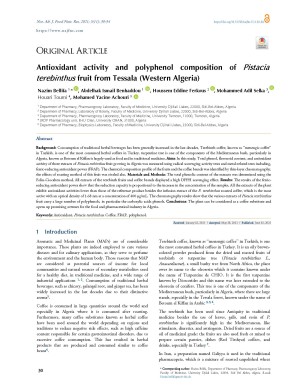Main Article Content
Antioxidant activity and polyphenol composition of Pistacia terebinthus fruit from Tessala (Western Algeria)
Abstract
Background: Consumption of traditional herbal beverages has been generally increased in the last decades, Terebinth coffee, known as ‘‘menengic coffee’’ in Turkish, is one of the most consumed herbal coffees in Turkey, turpentine tree is one of the components of the Mediterranean bush, particularly in Algeria, known as Betoum el Kiffan is largely used as food and in traditional medicine. Aims: In this study, Total phenol, flavonoid content, and antioxidant activity of three extracts of Pistacia trebinthus fruit growing in Algeria was measured using radical scavenging activity tests and metal-related tests including, ferric-reducing antioxidant power (FRAP). The chemical composition profile of the fruits and the coffee brands was identified by thin-layer chromatography, the effects of roasting method of this fruit was rivaled also. Materials and Methods: The total phenolic content of the extracts was determined using the Folin-Ciocalteu method. All extracts of the terebinth fruits and coffee brands displayed a high DPPH scavenging effect. Results: The results of the ferric-reducing antioxidant power show that the reduction capacity is proportional to the increase in the concentration of the samples. All the extracts of the plant exhibit antioxidant activities lower than those of the reference product besides the infusion extract of the P. terebinthus roasted coffee, which is the most active with an optical density of 1.68 nm at a concentration of 400 μg/mL. The chromatography results show that the various extracts of Pistacia terebinthus fruit carry a large number of polyphenols, in particular the carboxylic acids phenols. Conclusions: The plant can be considered as a coffee substitute and opens up promising avenues for the food and pharmaceutical industry in Algeria.







